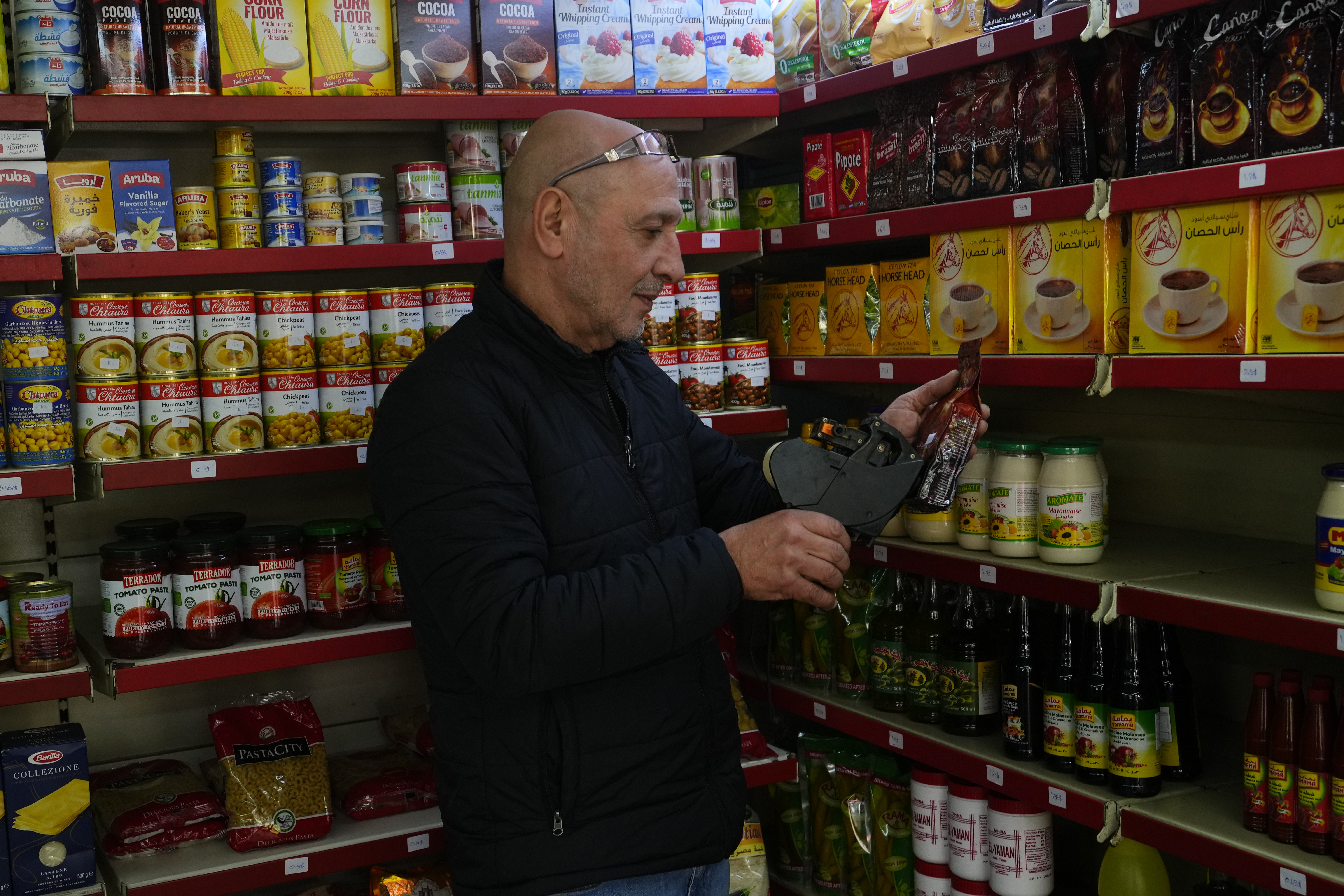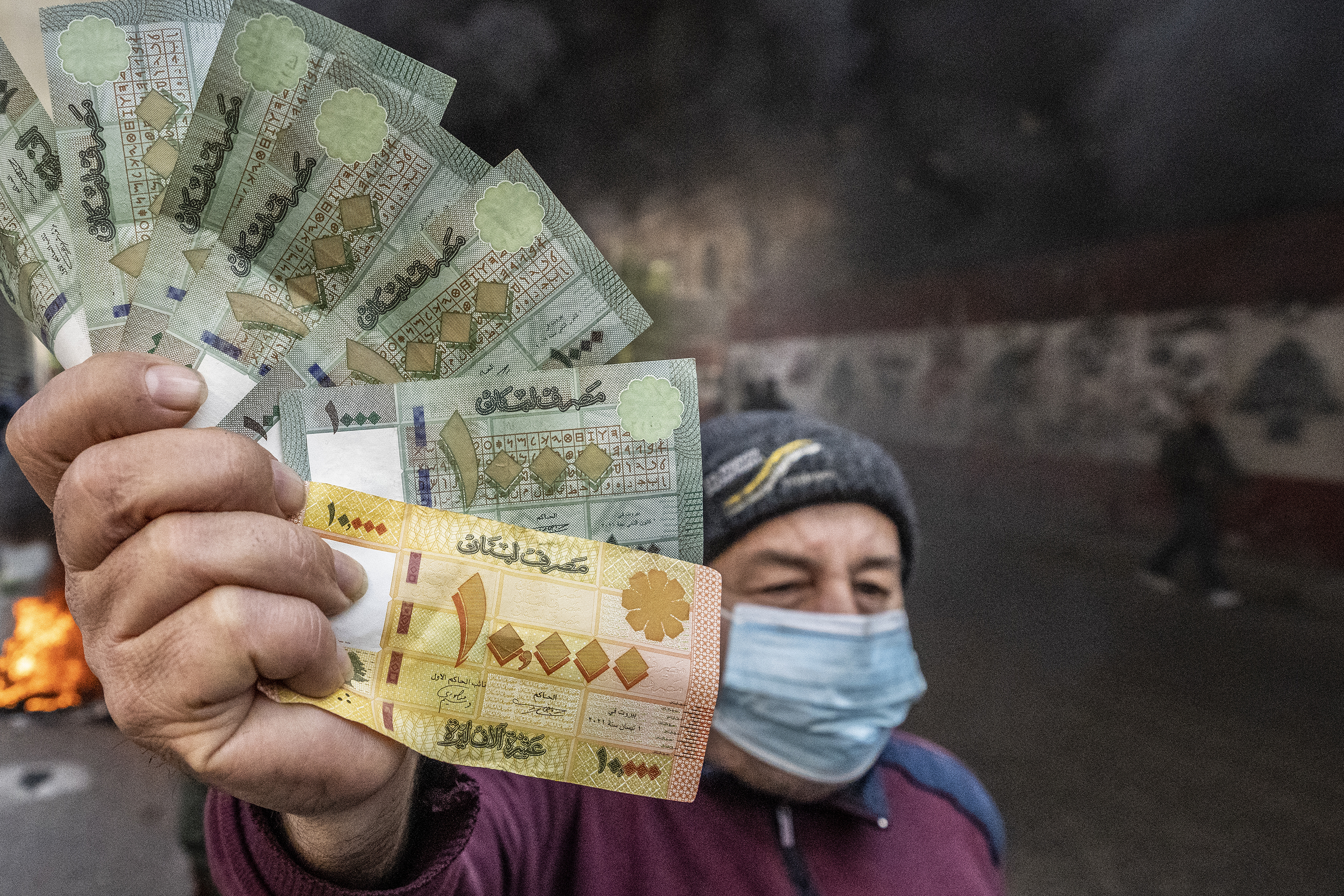
When Moheitain Bajazo opened his convenience store in Beirut in 1986, during the worst fighting of the Lebanese Civil War, he didn’t expect it to thrive. However, a few years later, his shelves were full of food and he needed 12 employees to help him manage his busy business.
Those days are gone. Bayazō now works mostly alone, often in the dark, to cut down on electricity bills. Regular customers struggle to make ends meet, and as they buy less, so does he, leaving some shelves and refrigerators empty.
With Lebanon’s economy in decline and its currency in free fall, Bazazo spends much of his time trying to keep up with exchange rate fluctuations. Companies like him are increasingly relying on one of the world’s most trusted assets, the US dollar, as a way to weather the worst financial crisis in the nation’s modern history.
“I used to live a comfortable life, but now I have only $100 left after covering the store’s expenses,” he says at the end of the month, entering the numbers into a calculator. “Sometimes I feel like I work a lot.”
The Lebanese pound has lost 95% of its value since the end of 2019 and most restaurants and shops now require payment in dollars. The government has recently begun allowing grocery stores like Bajazo to do the same.

While this “dollarization” is aimed at lowering inflation and stabilizing the economy, it also threatens to push more people into poverty and deepen the crisis.
This is because few in Lebanon have access to dollars to pay for food and other necessities at these prices. But widespread corruption means that political and economic leaders are resisting an alternative to dollarization: long-term reforms of banks and government institutions that will end waste and revitalize the economy.
Other countries, such as Zimbabwe and Ecuador, have turned to the dollar to offset hyperinflation and other economic woes, with mixed results. Pakistan and Egypt are also struggling with the collapse of their currencies, but their financial crises are largely related to an external event – Russia’s war in Ukraine, which has led to a sharp increase in food and energy prices.
Crisis … domestic production
Lebanon’s troubles are largely… self-caused.
As the country felt the effects of the COVID-19 pandemic, the deadly 2020 Beirut port bombing, and Russia’s invasion of Ukraine, its central bank simply printed more currency, eroding its value and fueling skyrocketing inflation.
75% of Lebanon’s 6 million people have fallen below the poverty line since the crisis began in 2019. Devastating power outages and shortages of medicine paralyzed much of public life.
The lack of foreign exchange has prompted banks to limit withdrawals, depriving millions of people’s savings. Some are driven to despair, breaking into banks to take their money by force.
The damage done in recent years has been exacerbated by decades of financial mismanagement, which has allowed the government to spend far more than its means allow. Recently, the head of the country’s Central Bank was accused of embezzlement of public funds and other offenses.
The crushed Lebanese pound changes course almost hourly. Although officially pegged to the dollar since 1997, the value of the pound is now determined by the opaque black market exchange rate that has become… the standard for most goods and services.

Last month, its value fell from about £64,000 to the dollar to £88,000 on the black market, while the official rate is £15,000. Worse still for a country that depends on imports of food, fuel and other goods valued in dollars, the government recently tripled the Lebanese pound tax that importers must pay on these goods.
Most likely, this will lead to an even greater increase in prices. For a small business, this can mean selling products at a loss minutes after they hit the shelves.
Dollarization may give the impression of greater financial stability, but it will also exacerbate already huge economic inequalities, said Sami Zugaib, an economist and research director at The Policy Initiative, a Beirut-based think tank.
“We have a class that has access to dollars and another part of the population that earns in Lebanese pounds, and now their incomes have completely decreased,” Zuhaib said.
Company Solutions
The transition to a dollar-dominated economy was not a government decree, but was carried out by companies and individuals who refused to accept payments in the rapidly depreciating currency.
First, luxury goods and services were priced in dollars for the wealthy, tourists, and private energy company owners who have to pay for imported diesel fuel. At that time most of the restaurants participated in the event. And now the products.
Acting Economy Minister Amin Salam said the Lebanese pound has been “used and abused” for the past three years and that food dollarization will bring some stability to exchange rate fluctuations.
As more people and businesses move away from the pound sterling, the dollar is slowly becoming the de facto currency. The distrust of the Lebanese pound has become irreversible, said Lyal Mansour, an economist who specializes in financial crises in dollarized countries.
“People are fed up with fluctuations in the dollar and the need to spend a lot of time exchanging it, so in practical, social terms, it is better to use dollars,” Mansour said. “This is the end of the Lebanese pound as we know it.”
Without a strategy to address the underlying problems of the economy, the government “will let it happen,” said Lawrence White, professor of economics at George Mason University.
What does dollarization mean?
Dollarization means the central bank can’t keep printing inflation-fueling currencies, and having a stronger currency could boost business confidence. But many people could come under additional pressure if Beirut officially adopts the dollar as its currency.
The millions of people in Lebanon who allowed the dollarization of luxury goods may not react in the same way to groceries, which are already experiencing some of the highest prices in the world.

According to a 2022 survey by the International Labor Organization and the Lebanese Government Statistics Agency, over 90% of the population receives income in Lebanese pounds. Families receiving money from relatives abroad spend most of it on daily expenses and medical expenses.
Public school teachers have been on strike for three months now because their salaries barely cover the cost of gasoline for commuting. Telco workers are threatening to quit because their wages don’t match the falling pound.
Lebanon is far from implementing the reforms needed to save the International Monetary Fund, such as restructuring banks and inefficient public services, reducing corruption and establishing a sound and transparent exchange rate system.
Zuhaib, a Beirut-based economist, said he fears the lack of credible political and economic reforms means dollarization is likely to exacerbate poverty, making it even harder for families to pay for health care, education and food.
Bahazo, the grocer’s owner, admits that dollar pricing will help him manage his finances and cut some of his losses, but he fears it will alienate some shoppers.
“Let’s see what happens,” Bayazo sighed. “Customers are already complaining.”
Source: Associated Press.
Source: Kathimerini
Lori Barajas is an accomplished journalist, known for her insightful and thought-provoking writing on economy. She currently works as a writer at 247 news reel. With a passion for understanding the economy, Lori’s writing delves deep into the financial issues that matter most, providing readers with a unique perspective on current events.